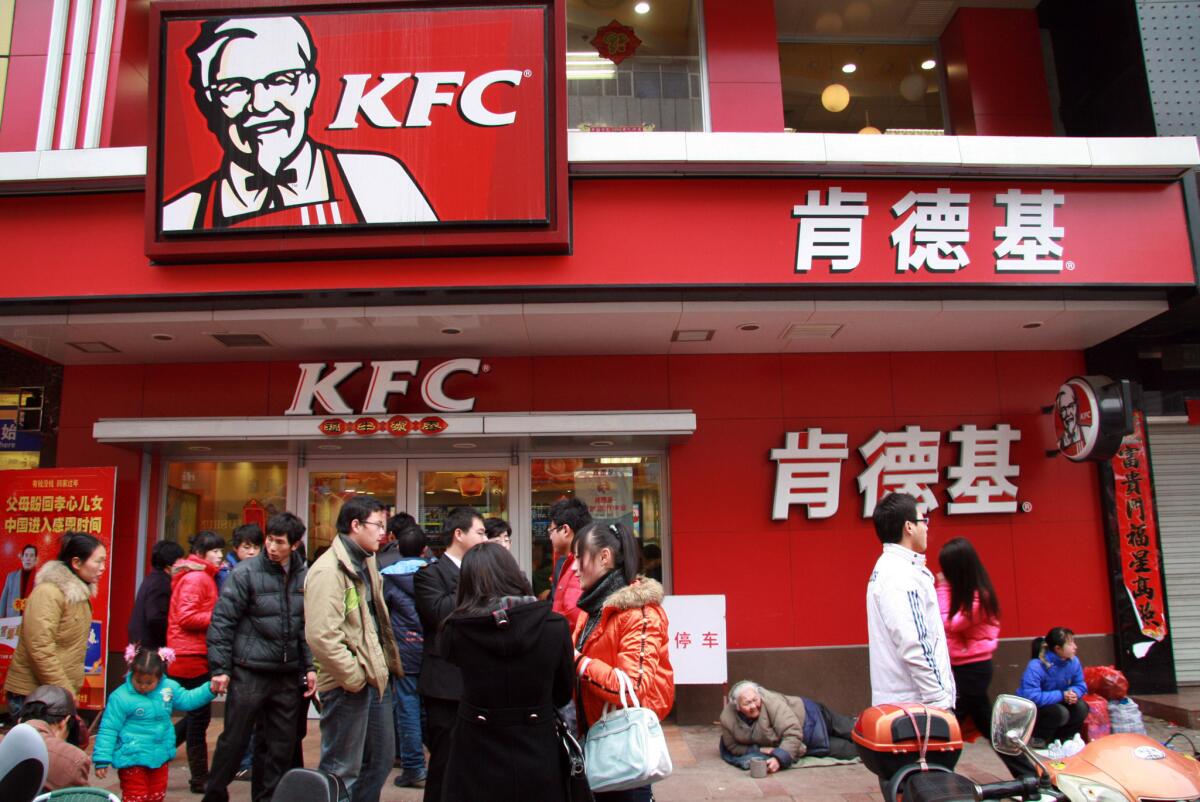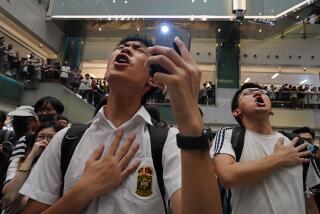In U.S.-China game of chicken over South China Sea, KFC feels the heat

Reporting from Beijing — Does diving into a bucket of Kentucky Fried Chicken make you a Chinese traitor?
That’s the in-your-face message some KFC customers in China received over the weekend in wake of a ruling by an international tribunal in the Netherlands in a case that pitted the Philippines against China.
For the record:
12:16 p.m. Aug. 22, 2019A previous version of this article referred to Jessica Chen Weiss as an assistant professor of government. She is an associate professor.
Colonel Sanders was no party to the arbitration, in which Manila (backed by Washington) prevailed in a dispute over maritime rights in the South China Sea.
But globalization means the chicken restaurant of your enemy’s friend can also become your enemy. China, which found the ruling to be anything but Finger Lickin’ Good, called the Philippines’ case a “trap” and said the proceedings had been “hyped and manipulated by the U.S.”
And now KFC is paying the price.
At an outlet of the restaurant chain in the city of Tangshan, scores of protesters carrying Chinese flags unfurled a red banner outside one of the fast-food outlets. “Boycott the U.S., Japan, South Korea and the Philippines; love our Chinese nation,” it declared. “What you eat is American KFC; what is lost is the face of our ancestors.”
A video that circulated on Chinese social media sites captured a protester outside the restaurant trying to persuade three young men not to go in. “If there is a war, every bomb the U.S. uses on us will have some share of your money,” he chides. “If you stop now, you are still Chinese. If you enter, when the U.S. and the Philippines start the war, you will all be traitors.” The prospective customers then appear to walk away.
What you eat is American KFC; what is lost is the face of our ancestors.
— A banner outside a KFC restaurant in Tangshan, China
Other videos online showed boycott advocates harassing patrons inside other KFC restaurants.
KFC is not the only foreign brand that has been targeted with boycott calls since the ruling — some self-declared patriots have called on their fellow Chinese to stop buying Nike shoes and iPhones (even though they’re assembled in China) and refrain from eating McDonald’s hamburgers and dried mangoes grown in the Philippines.
One mango vendor on the EBay-like website Taobao posted a message to his own online store proclaiming: “I love China. Ban sales of Philippine dry mangoes. Everyone is responsible for the fate of the nation. Let Filipinos starve to death.”
It was unclear how many KFC outlets had been targeted for boycotts; the company opened its first Chinese branch in 1987 and has more than 5,000 stores in China. Reached by phone, a spokeswoman for Yum Brands, the parent company of KFC, said the company had “done nothing wrong” and was a “victim.”
“The people who are doing this don’t understand what being patriotic really is,” said the spokeswoman, who refused to give her name. She said the company had gone to great lengths to “localize” its operations in China.
In September 2012, a dispute between China and Japan over some uninhabited islets in the East China Sea stoked protests that began with online calls for boycotting Japanese automakers and stealing videos from Japanese porn websites. But that Internet rhetoric later spilled into the streets, with crowds smashing Japanese-made cars and attacking Japanese restaurants and 7-Elevens, a chain owned by a Japanese company.
That year, Chinese authorities seemed to tolerate and even encourage some of the protests, with demonstrators who marched on the Japanese Embassy in Beijing saying they’d been given the day off by their employers and police appearing to play a large role in guiding marchers where to go and what to do.
So far, Chinese authorities have appeared reluctant to permit, let alone encourage, any protests at Philippine diplomatic missions.
And Jessica Chen Weiss, an associate professor of government at Cornell University and author of “Powerful Patriots: Nationalist Protest in China’s Foreign Relations,” noted that the government has tried to keep news of the KFC protests from spreading online.
She said the government wants “to maintain diplomatic flexibility after the ruling and prevent the situation from getting out of control. It may also be a sign of reassurance that Beijing’s offer to pursue negotiations with the Philippines is not empty.”
Internet censors have removed some of the most heated online messages in the wake of the tribunal’s ruling, including some warning that war between the U.S. and China was imminent in the South China Sea.
Since Chinese President Xi Jinping came to power nearly four years ago, his government has been fairly adept at both stoking and quashing nationalist sentiment according to its needs. Patriotic propaganda can be effective in drumming up support for Communist Party rulers, but once public opinion is inflamed, it can become destabilizing if crowds become too rowdy or turn their anger toward the government for failing to protect China’s interests.
In the weeks leading up to the ruling, a drumbeat of articles in the state-run media called into question the tribunal’s legitimacy and claimed that scores of countries (many of them developing nations in Africa dependent on China’s checkbook diplomacy) supported Beijing’s stance.
And after the decision last Tuesday, China’s state-run press unleashed a huge wave of ink denouncing and rejecting the ruling, including a 20,000-character “white paper.”
Any sustained boycott of KFC restaurants could be a major blow to the Kentucky-based Yum, which also owns the Pizza Hut and Taco Bell brands.
Powered mostly by sales at KFC, China has become the largest source of revenue for the company, responsible for about $1.6 billion of its $3 billion in revenue in the second quarter, the company reported last week. Yum plans to spin off its China operations into a separate entity this fall.
Yingzhi Yang and Nicole Liu in The Times’ Beijing bureau contributed to this report.
Follow me on Twitter @JulieMakLAT.
ALSO
Why Americans should care about the South China Sea
China has been killing turtles, coral and giant clams in the South China Sea, tribunal finds
More to Read
Sign up for Essential California
The most important California stories and recommendations in your inbox every morning.
You may occasionally receive promotional content from the Los Angeles Times.











